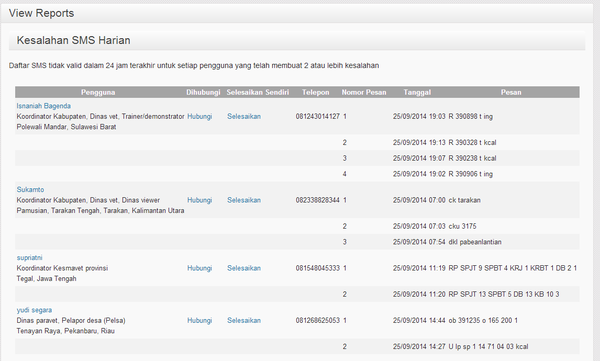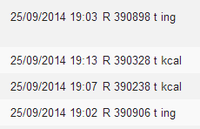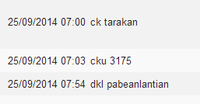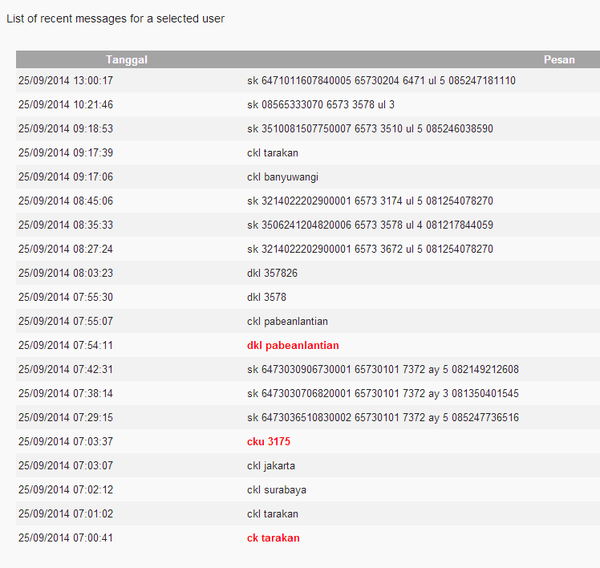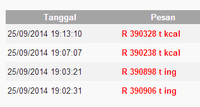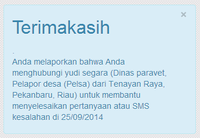Daily error and question report: Perbedaan revisi
| Baris 14: | Baris 14: | ||
Here's how to use the report: | Here's how to use the report: | ||
| − | + | 1. Check the report every day | |
| − | + | 2. For each user listed, look at the errors that they have made | |
{{example|Here is an example of the errors from one user. | {{example|Here is an example of the errors from one user. | ||
| Baris 23: | Baris 23: | ||
[[Image:Detailed errors2.png|200px|centre]] | [[Image:Detailed errors2.png|200px|centre]] | ||
Here they have made several different errors with different messages. Just looking at the errors, it is hard to tell if they were able to get the message right, or if they need help}} | Here they have made several different errors with different messages. Just looking at the errors, it is hard to tell if they were able to get the message right, or if they need help}} | ||
| − | + | 3. To find out if they were able to resolve the problem on their own, click on the user's name. This will take you to the iSIKHNAS web site and show you a list of all the messages sent by the user on that day. | |
[[Image:User's name link.png|200px|centre]] | [[Image:User's name link.png|200px|centre]] | ||
{{hlbox|Note: you will have to be online and log in to the web site to be able to see this detailed report}} | {{hlbox|Note: you will have to be online and log in to the web site to be able to see this detailed report}} | ||
| Baris 35: | Baris 35: | ||
This user has made nothing but mistakes, and hasn't been able to submit any of their reports. They need to be helped to understand the reason for the mistakes}} | This user has made nothing but mistakes, and hasn't been able to submit any of their reports. They need to be helped to understand the reason for the mistakes}} | ||
| − | + | 4. If the user needs help, the coordinator should contact them to explain why the messages were wrong, and give them some help to avoid similar problems in the future. This is very important - if a user fails repeatedly to send messages, they will start to hate the system, and not want to use it. If they understand the problem, they will be able to use it easily, and see how it can save them time, so they will love it. | |
| − | + | 5. Let the system administrators know what you have done. Just as the coordinator's job is to monitor and support the field users, the administrators' job is to monitor and support the coordinators. They need to know if the coordinators are doing their job properly, or if they need more support and training. | |
| − | + | 5.1 To record what they have done, for each user listed in the SMS error listing report, the coordinator should click on the link indicating the outcome. | |
[[Image:Contacted and resolved links.png|200px|centre]] | [[Image:Contacted and resolved links.png|200px|centre]] | ||
| − | + | 5.2 There are two links: | |
| − | + | 5.2.1 '''Contacted / Hubungi''' - this means that you have contacted the user, either in person or by phone, to help them with their problem | |
| − | + | 5.2.2 '''User resolved / Selesai sendiri''' - this means that, by examining the reports on the iSIKHNAS web site, you were able to see that the user was able to resolve the problem on their own and didn't need any assistance. | |
| − | + | 5.3 Click the correct link. This will take you to the iSIKHNAS web site, save your response and display the following page: | |
[[Image:SMS check response message.png|200px|centre]] | [[Image:SMS check response message.png|200px|centre]] | ||
| − | + | 5.4 If you haven't had a chance to do either, don't click either of the links. | |
| − | + | 5.5 Then go back to the email or original report, check the next user and repeat. | |
The step of reporting your actions is very important. If you don't, the iSIKHNAS administrators will think that you are not supporting the users in your area, and may recommend changing the coordinator. | The step of reporting your actions is very important. If you don't, the iSIKHNAS administrators will think that you are not supporting the users in your area, and may recommend changing the coordinator. | ||
Revisi per 27 Februari 2015 22.20
Daily error and question log
This report is sent automatically to Coordinators every day, and lists all users in their area of responsibility that have made two or more errors, or asked questions (with a Q message during the last 24 hours.
This is a key report to help coordinators identify when field users are having trouble and to help them quickly. Coordinators should check this report every day and follow-up users with problems immediately.
The report is delivered by email every day, but it can also be accessed at any time on the web site at: http://www.isikhnas.com/id/rout?id=12
This is a special report that contains active links to:
- help you understand the problems that the user is having, and
- let the Champions and system administrators know what action you have taken
Here's how to use the report: 1. Check the report every day 2. For each user listed, look at the errors that they have made
Here is an example of the errors from one user.
In this example, the user has tried to submit R reports for 3 different cases in the space of about 10 minutes. They are clearly having trouble
Look at another user:
Here they have made several different errors with different messages. Just looking at the errors, it is hard to tell if they were able to get the message right, or if they need help
3. To find out if they were able to resolve the problem on their own, click on the user's name. This will take you to the iSIKHNAS web site and show you a list of all the messages sent by the user on that day.
Note: you will have to be online and log in to the web site to be able to see this detailed report
Looking at all the messages from this user, it is much easier to see what they have been doing. They made several mistakes but then they were able to work out the correct message and continue to submit more data.
In contrast, look at the full listing from our fist user above:
This user has made nothing but mistakes, and hasn't been able to submit any of their reports. They need to be helped to understand the reason for the mistakes
4. If the user needs help, the coordinator should contact them to explain why the messages were wrong, and give them some help to avoid similar problems in the future. This is very important - if a user fails repeatedly to send messages, they will start to hate the system, and not want to use it. If they understand the problem, they will be able to use it easily, and see how it can save them time, so they will love it.
5. Let the system administrators know what you have done. Just as the coordinator's job is to monitor and support the field users, the administrators' job is to monitor and support the coordinators. They need to know if the coordinators are doing their job properly, or if they need more support and training. 5.1 To record what they have done, for each user listed in the SMS error listing report, the coordinator should click on the link indicating the outcome.
5.2 There are two links: 5.2.1 Contacted / Hubungi - this means that you have contacted the user, either in person or by phone, to help them with their problem 5.2.2 User resolved / Selesai sendiri - this means that, by examining the reports on the iSIKHNAS web site, you were able to see that the user was able to resolve the problem on their own and didn't need any assistance. 5.3 Click the correct link. This will take you to the iSIKHNAS web site, save your response and display the following page:
5.4 If you haven't had a chance to do either, don't click either of the links. 5.5 Then go back to the email or original report, check the next user and repeat.
The step of reporting your actions is very important. If you don't, the iSIKHNAS administrators will think that you are not supporting the users in your area, and may recommend changing the coordinator.

